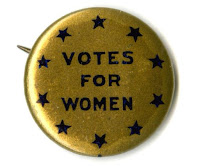by Shanna Hatfield
While researching my soon-to-be-released book Quinn (Pendleton Petticoats Book 9), I looked into the suffrage movement in Oregon in 1912.
This was a pivotal year for the cause because the suffrage issue had made it on the ballet in four previous elections and faced defeat each time.
Many were determined the November election would bring success. One of those women was Abigail Scott Duniway.
Born in 1934 in Groveland, Illinois to John and Anne Scott, Abigail was one of nine children who survived infancy. She grew up on the family farm and attended school intermittently.
In March 1852, despite Anne's health concerns, John organized a party of thirty people and five ox-drawn wagons to emigrate to Oregon. Anne died of cholera near Fort Laramie on the Oregon Trail in June. Willie, the youngest of Abigail's siblings, died in August along the Burnt River in Oregon. In October, the emigrants finally reached the Willamette Valley in Oregon.
Abigail taught school then married Benjamin Charles Duniway, a farmer from Illinois. They had six children and farmed in Clackamas County until Benjamin moved the family to a farm near Lafayette, Oregon. They lost the second farm after a friend of Benjamin's defaulted on a note endorsed by Benjamin. Soon after, Benjamin was permanently disabled in a wagon accident involving a runaway team, leaving Abigail to support the family.
She opened and ran a small boarding school in Lafayette, then moved the family to Albany where she taught in a private school for a year. She then opened a millinery and notions shop that she ran for five years. Stories relayed to her by married patrons of her shop about the injustice and mistreatment they received at the hands of their husbands left her angry and determined to do something.
In 1871, with Benjamin's support, they moved to Portland and founded The New Northwest, a weekly newspaper devoted to women's rights, including suffrage. She continued publishing the paper for sixteen years.
Abigail encountered personal setbacks such as poor health, money problems, and opposition to her efforts from her brother, Harvey, who also edited a Portland paper, The Oregonian. Reportedly, her brother opposed woman receiving the right to vote and wrote many articles on the subject. Abigail persisted in her suffrage efforts despite political opposition.
 |
Abigail Scott Duniway signs Oregon's
Equal Suffrage Proclamation on
Nov. 30, 1912 as Governor Oswald West
and Viola M. Coe watch.
(Image courtesy Library of Congress)
|
Her tenacious endeavors paid off in 1912 when Oregon became the seventh state to pass a women's suffrage amendment.
Governor Oswald West asked Abigail to write and sign the equal suffrage proclamation. She was the first woman to register to vote in Multnomah County.
You can find the proclamation here.
After years of fighting for the right to vote, women in Oregon finally received it, in no small part thanks to the efforts of Abigail Scott Duniway.
Women around the state had formed suffrage leagues, joining the efforts made around the country.
In 1912, Elizabeth Arden (yes, that Elizabeth Arden of skincare and cosmetics fame) participated in the suffrage movement and supplied red lipstick to the suffragettes. The striking shade (that was often shunned before), became part of a standard rally uniform and a symbol of female anticipation.
Women wore buttons proclaiming Votes for Women.
This particular button boasted 10 stars representing the 10 states in which women had the right to vote at the time the button was created: Wyoming (1869), Colorado (1893), Utah (1896), Idaho (1896), Washington (1910), California (1911), Kansas, Oregon and Arizona (all 1912), and Montana (1914).
Women also donned sashes that reminded everyone who saw them to consider Votes for Women.
In my story, Quinn, the local seamstress creates sashes for the women of the Pendleton suffrage league to wear. The women proudly donned them, along with their red lipstick and buttons, to march around town, singing suffrage songs.
As I tried to imagine the songs they might sing, I searched for some tidbits from the past and found an old songbook published in Kansas.
 The songbook contains 28 songs (set to common tunes, many hymns) that express the perspective of women's rights. Titles include "Dare You Do It?" and "Three Blind Men." The lyrics to the songs touch on the issues of the women's rights movement in America at the time. The songs were written by Henry W. Roby, a prominent medical doctor, and published by Crane and Company in Topeka, KS.
The songbook contains 28 songs (set to common tunes, many hymns) that express the perspective of women's rights. Titles include "Dare You Do It?" and "Three Blind Men." The lyrics to the songs touch on the issues of the women's rights movement in America at the time. The songs were written by Henry W. Roby, a prominent medical doctor, and published by Crane and Company in Topeka, KS.
To learn more about Quinn and the fictional account (peppered with historical tidbits) of the Oregon suffrage movement shared in my story, join us April 12 for the 4th annual Petticoat Ball!
~*~
USA Today Bestselling Author Shanna Hatfield writes
character-driven romances with relatable heroes and heroines. Her historical
westerns have been described as “reminiscent of the era captured by Bonanza and
The Virginian” while her contemporary works have been called “laugh-out-loud
funny, and a little heart-pumping sexy without being explicit in any way.”
Convinced everyone
deserves a happy ending, this hopeless romantic is out to make it happen,
one story at a time. When she isn’t writing or indulging in chocolate (dark and
decadent, please), Shanna hangs out with her husband, lovingly known as Captain
Cavedweller.
Shanna loves to hear from readers. Follow her online at:
ShannaHatfield | Facebook | Newsletter | BookBub | Pinterest







No comments:
Post a Comment
Our readers: If you like a post, please consider sharing on your Facebook and/or Twitter pages, and leave a comment. The cowgirls welcome them and will respond if you ask questions. Any Spam will be deleted.